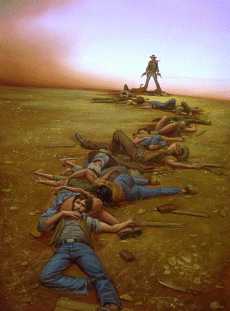Westerns, for Slotkin, tell the myth of a 'savage war'. Indians are the central issue because the myth is about conquest and race.
"The myth of the Frontier is our oldest and most characteristic myth, expressed in a body of literature, folklore, ritual, historiography, and polemics produced over a period of three centuries. According to this myth-historiography, the conquest of the wilderness and the subjugation or displacement of the Native Americans who originally inhabited it have been the means to our achievement of a national identity, a democratic polity, an over-expanding economy and a phenomenally dynamic and 'progressive' civilization." (p. 10)
"Violence is central to both the historical development of the Frontier and its mythic representation." (p. 11)
"The moral landscape of the Frontier Myth is divided by significant borders, of which the wilderness/civilization, Indian/White border is the most basic. The American must cross the border into "Indian Country' and experience a 'regression' to a more primitive and natural condition of life so that the false values of the 'metropolis' can be purged and a new, purified social contract enacted." (p. 14)
Needless to say, I agree with the quotes in Gunfighter Nation. And with the quotes in The Wild West about Gunfighter Nation.
Gunfighter Nation is one of many books I own but haven't read yet. I suspect I'll agree 100% with it and find something to quote on every page. Which will drive me crazy because I'll end up spending too much time on it in this blog.
For more on the subject, see The Best Indian Books.


4 comments:
You are more a child of the Western era than I am, but I don't see Indians as being required or necessary to the "Western". They are a common element, yes (perhaps in most) and I see the point about Indians being present in "crossing the dangerous West in a stagecoach" even if they do not show.
However, to me, the Western not only includes "cowboys and Indians" but it also includes gunfighter showdown stories (the OK Corral adaptations and inspired stories), or the small rancher vs big rancher story. Or combinations thereof, such as "Shane".
Your illustration used for the post is from Stephen King's "Dark Tower" series. This is a sort of meta-Western which I recall as being devoid of Indians, Indian-stand-ins, and the setting is in ways the opposite of a wild new frontier.
Our whole cowboy mythology exists primarily because of Indians. Why did settlers huddle in small towns rather than sprawling suburbs? Why did gunfighters loom so importantly in town affairs? Because of the explicit or implicit presence of Indians.
Again, "Indians define the wild frontier, the frontier of American myth, so they are always present in mythical stories, even if only implicitly." This is a philosophical or metaphysical claim, so I don't think we can prove it true or false. But I believe it's true. Frederick Jackson Turner made a convincing case with his Frontier Thesis and I bet Slotkin's book is persuasive too.
Don't the Dark Tower books include Slow Mutants and other primitive people? Why does a Western-style series require savages in an otherwise empty land? Because Americans want and need to believe in the idea of taming a "wild" frontier. That is, a place where the white man represents a bulwark of civilization against uncivilized "others."
Good point on the Slow Mutants, but they are minor in the series, figuring big in the first volume, which is the thinnest one of all. The later thick volumes have Western-style towns, devoid of Indian stand-ins.
"Why did gunfighters loom so importantly in town affairs? Because of the explicit or implicit presence of Indians."
Just last week I watched two of the Sergio Leone / Man with No Name spaghetti Westerns. For the first time. Where is the Indian presence in film #1 and film #3?
I sure didn't see any. Perhaps it is because these and Stephen King's "Dark Tower" harken back to tales of heroes and battles.... a tradition older than the "Western".
I guess that is the main reason I do not buy into the theory that all Westerns have some sort of Native element.... because some Westerns are really types of stories pre-dating the Wild West, but with Western trappings added.
Re "Where is the Indian presence in film #1 and film #3?" I covered that with the word "implicit." It means Indians were in the area even if the movie didn't show them. Their (invisible) presence affected the characters' attitudes and behavior.
The only time I'd say Indians weren't an implicit threat is if some character explicitly said, "We settled the Indian problem long ago. They no longer bother us." Did anyone say anything like that in your spaghetti Westerns?
Post a Comment